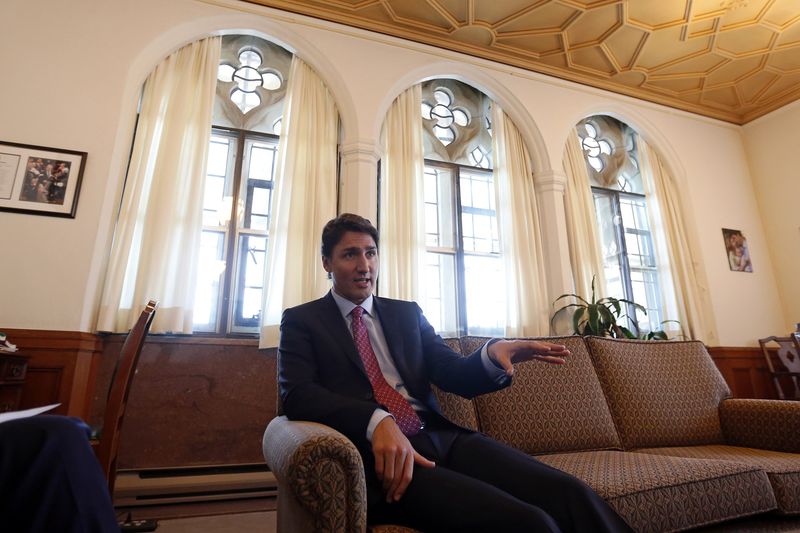By Randall Palmer and David Ljunggren
TORONTO, Nov 2 (Reuters) - Incoming Canadian Prime Minister
Justin Trudeau will move quickly to implement campaign promises
such as overhauling security legislation, sources in his party
say, but faces early challenges with pledges on Syrian refugees
and climate change.
The Liberal leader, who is expected to enjoy an extended
honeymoon after his massive Oct. 19 election win ended a decade
of Conservative governing, plans to call Parliament to return in
early December, the sources said, to start work on an agenda
which will also include middle-class tax cuts.
"All the low-hanging fruit, all the ones that he can make a
decision on right away, I'm expecting we'll see a lot of that
happening," said one Liberal Party source, who declined to speak
on the record because of the sensitivity of strategic plans.
A second party source, who also spoke off the record, said
other measures the Liberals would quickly act on include
reinstating a mandatory long-form national census that was
canceled by the Conservatives, and naming a commissioner to head
an inquiry into missing and murdered indigenous women.
"His instinct to try to tick off as many promises as he can
is the right thing to do," former Liberal Deputy Prime Minister
John Manley said in an interview.
Trudeau pledged during the campaign that his first piece of
legislation would enact tax cuts for income from C$44,700
($34,140) to C$89,401 and tax hikes for incomes above C$200,000.
He also promised to repeal controversial elements of
Conservative anti-terrorism legislation to give more weight to
civil rights.
Moving quickly on easily fulfilled promises will give the
Liberals time to work out how to deliver on pledges for major
infrastructure spending and legalizing marijuana, which the
second Liberal source said was likely to occur towards the end
of the Liberals' four-year mandate.
A Trudeau spokeswoman did not respond to requests for
comment.
Trudeau, the 43-year-old son of former Prime Minister Pierre
Trudeau, should have little trouble moving his legislative
agenda through Canada's Parliament after his party won 184 of
the 338 seats in the House of Commons.
And even the Conservatives of outgoing Prime Minister
Stephen Harper, on the hunt for a new leader after being pushed
to opposition, predict Trudeau will enjoy plenty of good will.
"There are already some signs of the honeymoon that will go
forward," said Peter Kent, a former Conservative minister
reelected as a member of Parliament.
But members of the outgoing government warn Trudeau will
have a hard time meeting a promise to bring in 25,000 Syrian
refugees by year-end.
By comparison, the United States, with nine times as many
people as Canada, is aiming to take in at least 10,000 Syrian
refugees over the next year.
"He's got to make sure that none of those 25,000 refugees
are going to cause him any kind of security heartburn," said Ian
Brodie, Harper's first chief of staff.
A person with direct knowledge of the file, who spoke on
condition of anonymity because of the sensitivity of the issue,
said officials at the immigration ministry had concluded that
the only way to achieve the goal would be to airlift the
refugees into Canada and then carry out mandatory health and
security checks.
The source said the challenge with screening on Canadian
soil is that even if some are rejected, it is hard to deport
people once they are in the country.
Outgoing senior Conservative cabinet minister Tony Clement
said the Trudeau pledge to bring them all in by year end was
unrealistic.
"There's no way to do that without incurring a lot of
expense or alternatively having an impact on our safety and
security, he said.
The second Liberal source conceded Trudeau might have to
push back the Dec. 31 deadline, but would still bring in 25,000.
"If he has to say he'll take an extra two or three months to
make it happen, I don't think anyone will think that's
unreasonable," said the source.
Another early challenge for Trudeau will be crafting a
national consensus on climate change, a sensitive topic because
of climbing carbon emissions driven by oil production in
Canada's west.
Trudeau has promised to take the 10 provincial premiers, who
have wide-ranging control over their natural resources, with him
to this year's U.N. climate change conference in Paris and says
he will sit down with them within three months to set a national
target.
But already, the right-leaning premier of Saskatchewan, the
second-largest oil-producing province, said he was going to
Paris to make sure Trudeau didn't "kneecap our economy."
One of the Liberal sources said Trudeau would attend the
start of the talks on Nov. 30 but was unlikely to stay beyond
Dec. 2 so he could return to prepare for the opening of
Parliament.
A diplomatic source familiar with the file corroborated this
account, saying Trudeau would not spend more than three days in
Paris.
($1 = 1.3093 Canadian dollars)
(Editing by Jeffrey Hodgson and Alan Crosby)
